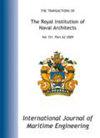Improving ship sustainability by re-using engineering simulators in multi-objective optimization
IF 0.6
4区 工程技术
Q4 ENGINEERING, MARINE
引用次数: 0
Abstract
Alternatives for enhancing a cruise ship’s energy efficiency were investigated by introducing different waste heat recovery technologies and battery systems in the machinery. A ship designer’s in-house ship energy system simulator was applied in a cloud-based framework for simulation-based optimization. This multi-objective optimization with economic and environmental objectives used genetic algorithm for finding the best overall solution in a complex ship energy system design task. The results suggest that adding battery capacity alone contributes very moderately to reducing the case ship fuel consumption and, therefore, carbon emissions. Nevertheless, a combination of steam turbines and organic Rankine cycle units would offer the largest fuel saving potential with the lowest investment cost in the case setup. Also, the main engines’ running hours were of interest. The presented approach can bring significant added value for sustainable ship design with minimal additional effort.利用工程模拟器进行多目标优化,提高船舶可持续性
通过引入不同的废热回收技术和机械电池系统,研究了提高游轮能源效率的替代方案。将船舶设计公司内部的船舶能源系统模拟器应用于基于云的框架中,进行基于仿真的优化。针对复杂的船舶能源系统设计任务,采用遗传算法对经济和环境两大目标进行多目标优化。结果表明,单独增加电池容量对减少船舶燃料消耗和碳排放的贡献非常适度。然而,在这种情况下,蒸汽轮机和有机朗肯循环装置的组合将以最低的投资成本提供最大的燃料节约潜力。此外,主要发动机的运行时间也令人感兴趣。所提出的方法可以为可持续船舶设计带来显著的附加价值,而额外的努力却很少。
本文章由计算机程序翻译,如有差异,请以英文原文为准。
求助全文
约1分钟内获得全文
求助全文
来源期刊

International Journal of Maritime Engineering
ENGINEERING, MARINE-
CiteScore
1.20
自引率
0.00%
发文量
18
审稿时长
>12 weeks
期刊介绍:
The International Journal of Maritime Engineering (IJME) provides a forum for the reporting and discussion on technical and scientific issues associated with the design and construction of commercial marine vessels . Contributions in the form of papers and notes, together with discussion on published papers are welcomed.
 求助内容:
求助内容: 应助结果提醒方式:
应助结果提醒方式:


